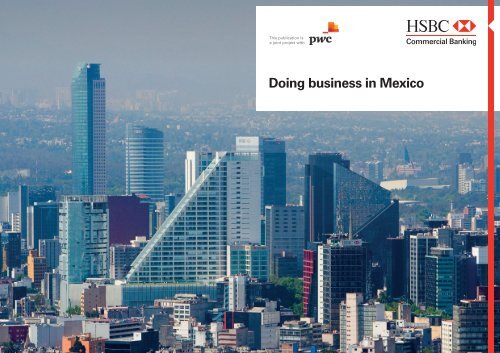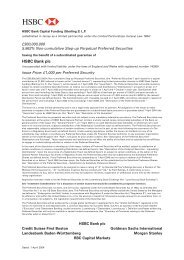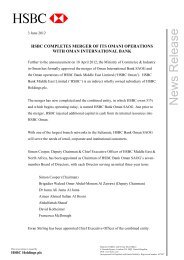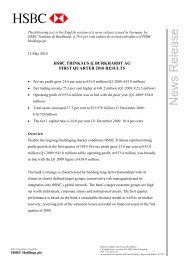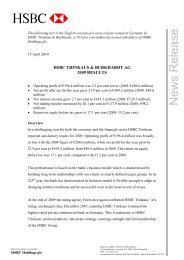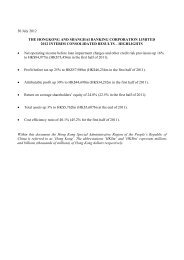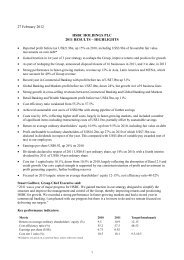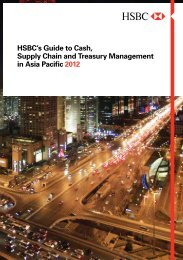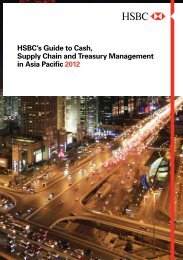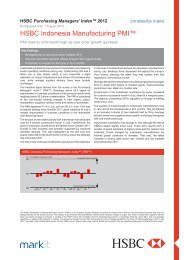HSBC Doing business in Mexico
HSBC Doing business in Mexico
HSBC Doing business in Mexico
You also want an ePaper? Increase the reach of your titles
YUMPU automatically turns print PDFs into web optimized ePapers that Google loves.
This publication is<br />
a jo<strong>in</strong>t project with<br />
<strong>Do<strong>in</strong>g</strong> <strong>bus<strong>in</strong>ess</strong> <strong>in</strong> <strong>Mexico</strong>
Contents<br />
Executive summary 4<br />
Foreword 6<br />
Introduction – <strong>Do<strong>in</strong>g</strong> <strong>bus<strong>in</strong>ess</strong> <strong>in</strong> <strong>Mexico</strong> 8<br />
Conduct<strong>in</strong>g <strong>bus<strong>in</strong>ess</strong> <strong>in</strong> <strong>Mexico</strong> 12<br />
Taxation <strong>in</strong> <strong>Mexico</strong> 18<br />
Audit and accountancy 24<br />
Human Resources and Employment Law 26<br />
Trade 30<br />
Bank<strong>in</strong>g <strong>in</strong> <strong>Mexico</strong> 32<br />
<strong>HSBC</strong> <strong>in</strong> <strong>Mexico</strong> 34<br />
Country overview 36<br />
Contacts 38<br />
Disclaimer<br />
This document is issued by <strong>HSBC</strong><br />
<strong>Mexico</strong> (the ‘bank’) <strong>in</strong> <strong>Mexico</strong>.<br />
It is not <strong>in</strong>tended as an offer or<br />
solicitation for <strong>bus<strong>in</strong>ess</strong> to anyone<br />
<strong>in</strong> any jurisdiction. It is not <strong>in</strong>tended<br />
for distribution to anyone located<br />
<strong>in</strong> or resident <strong>in</strong> jurisdictions which<br />
restrict the distribution of this<br />
document. It shall not be copied,<br />
reproduced, transmitted or further<br />
distributed by any recipient.<br />
The <strong>in</strong>formation conta<strong>in</strong>ed <strong>in</strong><br />
this document is of a general<br />
nature only. It is not meant to<br />
be comprehensive and does not<br />
constitute f<strong>in</strong>ancial, legal, tax or<br />
other professional advice. You<br />
should not act upon the <strong>in</strong>formation<br />
conta<strong>in</strong>ed <strong>in</strong> this publication without<br />
obta<strong>in</strong><strong>in</strong>g specific professional<br />
advice. This document is produced<br />
by the Bank together with<br />
PricewaterhouseCoopers<br />
(‘PwC’). Whilst every care has<br />
been taken <strong>in</strong> prepar<strong>in</strong>g this<br />
document, neither the Bank<br />
nor PwC makes any guarantee,<br />
representation or warranty<br />
(express or implied) as to its<br />
accuracy or completeness, and<br />
under no circumstances will the<br />
Bank or PwC be liable for any<br />
loss caused by reliance on any<br />
op<strong>in</strong>ion or statement made <strong>in</strong> this<br />
document. Except as specifically<br />
<strong>in</strong>dicated, the expressions of op<strong>in</strong>ion<br />
are those of the Bank and/or PwC<br />
only and are subject to change<br />
without notice.<br />
The materials conta<strong>in</strong>ed <strong>in</strong> this<br />
publication were assembled<br />
<strong>in</strong> November 2011 and were<br />
based on the law enforceable and<br />
<strong>in</strong>formation available at that time.
4<br />
Executive summary<br />
<strong>Mexico</strong> offers an attractive<br />
<strong>bus<strong>in</strong>ess</strong> environment, legal<br />
certa<strong>in</strong>ty, one of the world’s<br />
largest free trade agreement<br />
networks, as well as highly<br />
developed economic sectors<br />
that offer very competitive<br />
costs. The country is<br />
committed to develop<strong>in</strong>g<br />
its <strong>in</strong>frastructure <strong>in</strong> order to<br />
create a world-class logistics<br />
platform suitable for<br />
<strong>in</strong>ternational <strong>bus<strong>in</strong>ess</strong>es.<br />
The government of <strong>Mexico</strong><br />
is also <strong>in</strong>vest<strong>in</strong>g <strong>in</strong> <strong>in</strong>itiatives<br />
to simplify regulations<br />
applicable to <strong>in</strong>ternational<br />
<strong>bus<strong>in</strong>ess</strong>es. Specifically, the<br />
Mexican Government supports<br />
foreign <strong>in</strong>vestments through<br />
different public <strong>in</strong>stitutions<br />
which advise, support and<br />
facilitate various <strong>bus<strong>in</strong>ess</strong><br />
transactions <strong>in</strong> <strong>Mexico</strong>.<br />
In 2010, <strong>Mexico</strong> has been<br />
favoured by large amounts of<br />
foreign direct <strong>in</strong>vestment, <strong>in</strong><br />
the automotive, manufactur<strong>in</strong>g,<br />
aviation, <strong>in</strong>formation technology<br />
and tourism sectors.<br />
<strong>Mexico</strong> is today´s opportunity<br />
• Strategic geographic location.<br />
• Competitive labour costs.<br />
• Accessibility to large markets.<br />
• Low operation and<br />
transportation costs.<br />
• Young, talented and highly<br />
qualified population.<br />
• Economic stability<br />
and its favourable<br />
<strong>bus<strong>in</strong>ess</strong> environment.<br />
• Wide network of free<br />
trade agreements.<br />
• Legal certa<strong>in</strong>ty for<br />
foreign <strong>in</strong>vestment.<br />
• Strong and dynamic<br />
manufactur<strong>in</strong>g <strong>in</strong>dustries.<br />
• Internal market.<br />
• Infrastructure and logistic<br />
abilities for <strong>in</strong>dustry.
6<br />
Foreword<br />
Accord<strong>in</strong>g to <strong>HSBC</strong>’s Report<br />
‘The World <strong>in</strong> 2050’, <strong>Mexico</strong><br />
will be the eigth largest<br />
economy of the world <strong>in</strong> 2050.<br />
Free Trade Agreements with<br />
47 nations all around the world<br />
support <strong>Mexico</strong>’s status as a<br />
very attractive trade hub.<br />
A strategic geographic location<br />
<strong>in</strong> the North American region<br />
provides a reduction <strong>in</strong> costs of<br />
<strong>in</strong>ventory, transportation and<br />
shipp<strong>in</strong>g for companies located<br />
<strong>in</strong> NAFTA countries. Trucks<br />
can deliver merchandise and<br />
products to any po<strong>in</strong>t <strong>in</strong> the<br />
U.S. with<strong>in</strong> 24 hours.<br />
<strong>Mexico</strong>’s policy objectives<br />
to <strong>in</strong>crease its productivity,<br />
efficiency and quality standards,<br />
have transformed <strong>Mexico</strong> <strong>in</strong>to<br />
one of the world’s lead<strong>in</strong>g<br />
manufactur<strong>in</strong>g countries.<br />
Highly developed<br />
telecommunications systems,<br />
<strong>in</strong>clud<strong>in</strong>g domestic and<br />
<strong>in</strong>ternational fibre-optic<br />
and satellite systems, keep<br />
<strong>bus<strong>in</strong>ess</strong>es connected on a<br />
national and global scale to<br />
meet <strong>bus<strong>in</strong>ess</strong> demands.<br />
Government macroeconomic<br />
policies encourage foreign<br />
<strong>in</strong>vestment and a stable<br />
economic and political<br />
environment sought by<br />
<strong>in</strong>vestors worldwide.<br />
<strong>Mexico</strong> represents a potential<br />
consumer base of 112 million<br />
<strong>in</strong>dividuals whose average<br />
yearly <strong>in</strong>come cont<strong>in</strong>ues to rise<br />
steadily, as does their appetite<br />
for consumer products of all<br />
k<strong>in</strong>ds. Its employment rate is<br />
also on the rise, contribut<strong>in</strong>g<br />
to the economic growth of the<br />
nation. Foreign and domestic<br />
demand is <strong>in</strong>creas<strong>in</strong>g, and GDP<br />
per capita doubles the average<br />
of GDP per capita <strong>in</strong> the BRIC<br />
countries.<br />
The country’s young, skilled<br />
and plentiful workforce (60%<br />
under age 25) performs at<br />
world-class productivity levels.<br />
An abundance of valuable<br />
raw materials throughout the<br />
country supports a healthy<br />
’bottom l<strong>in</strong>e’ for <strong>in</strong>vest<strong>in</strong>g firms.<br />
<strong>Mexico</strong> is the perfect location<br />
for companies desir<strong>in</strong>g to<br />
cost-effectively sell products<br />
and services to consumers<br />
liv<strong>in</strong>g <strong>in</strong> North, Central and<br />
South American as well as<br />
the Caribbean.<br />
<strong>Mexico</strong> has provided <strong>HSBC</strong><br />
with the opportunity to create<br />
a solid platform for further<br />
expansion of the <strong>bus<strong>in</strong>ess</strong> <strong>in</strong><br />
Lat<strong>in</strong> America, a region that is<br />
almost comparable to Ch<strong>in</strong>a <strong>in</strong><br />
terms of GDP and consumption.<br />
<strong>HSBC</strong> has made <strong>Mexico</strong> its<br />
f<strong>in</strong>ancial hub for Lat<strong>in</strong> America,<br />
where it headquarters its<br />
Lat<strong>in</strong> American <strong>bus<strong>in</strong>ess</strong>.<br />
<strong>HSBC</strong> <strong>Mexico</strong> is the fourth<br />
largest bank <strong>in</strong> deposits. It<br />
has 1,186 branches and 6,500<br />
ATMs, the largest network <strong>in</strong><br />
the country.<br />
Currently, <strong>HSBC</strong> has 8 million<br />
customers and more than<br />
19,500 employees.<br />
<strong>Mexico</strong> is, and will cont<strong>in</strong>ue<br />
to be, an important player<br />
<strong>in</strong> the global economy due<br />
to its openness, size and<br />
opportunities. We at <strong>HSBC</strong> are<br />
excited about the prospects to<br />
cont<strong>in</strong>ue grow<strong>in</strong>g our <strong>bus<strong>in</strong>ess</strong>,<br />
and we would encourage you<br />
to do the same.<br />
Luis Peña-Kegel<br />
Chief Executive Officer<br />
<strong>HSBC</strong> <strong>Mexico</strong>
8<br />
Introduction<br />
<strong>Do<strong>in</strong>g</strong> <strong>bus<strong>in</strong>ess</strong> <strong>in</strong> <strong>Mexico</strong><br />
Located <strong>in</strong> the North American<br />
subcont<strong>in</strong>ent, <strong>Mexico</strong> is framed<br />
by the U.S. to the North,<br />
Guatemala and Belize to the<br />
south, the Gulf of <strong>Mexico</strong> to the<br />
east and the Pacific Ocean to the<br />
west. The country’s official name<br />
is Estados Unidos Mexicanos<br />
(United States of <strong>Mexico</strong>), its<br />
official language is Spanish,<br />
with only a small portion of its<br />
population boast<strong>in</strong>g a command<br />
of English. Its functional<br />
currency is the Mexican peso.<br />
<strong>Mexico</strong> is a Federal Republic<br />
comprised of 31 States and a<br />
Federal District (<strong>Mexico</strong> City)<br />
with its political system made up<br />
of three levels of government,<br />
federal, state and municipal,<br />
and government made up of<br />
three powers; the executive<br />
(President), the legislative and<br />
the judicial.<br />
For over 50 years, the ma<strong>in</strong><br />
eng<strong>in</strong>e power<strong>in</strong>g <strong>Mexico</strong>’s<br />
economy has been crude<br />
extraction and exportation;<br />
however, more recently, other<br />
factors have emerged that<br />
have grown over time, such as<br />
remittances sent back to <strong>Mexico</strong><br />
by Mexican residents <strong>in</strong> the<br />
U.S., and also the transformation<br />
<strong>in</strong>dustry (e.g. automotive,<br />
textile, electronics) and sectors<br />
such as tourism, construction,<br />
telecommunications have been<br />
grow<strong>in</strong>g <strong>in</strong> the last decade.<br />
Economic environment<br />
Nearly 25 years ago, <strong>Mexico</strong><br />
embarked on a path towards<br />
greater economic openness,<br />
with an emphasis on open<strong>in</strong>g<br />
itself to foreign trade and on<br />
attract<strong>in</strong>g foreign <strong>in</strong>vestment.<br />
Throughout this period, many<br />
significant changes were made<br />
to the Foreign Investment Law.<br />
Free trade agreements were<br />
signed with the most important<br />
economies worldwide (the<br />
North American Free Trade<br />
Agreement, the Free Trade<br />
Agreements with the European<br />
Union and Japan, among<br />
others), as well as a number<br />
of tax treaties to avoid double<br />
taxation, signed with more<br />
than 30 countries.<br />
<strong>Mexico</strong> has reached a<br />
consistent, solid and stable<br />
macroeconomic framework, as<br />
a result of the monetary policy<br />
implemented by Banco de<br />
<strong>Mexico</strong> (Central Bank) and the<br />
F<strong>in</strong>ance M<strong>in</strong>istry, thus allow<strong>in</strong>g<br />
for certa<strong>in</strong>ty <strong>in</strong> the decision<br />
mak<strong>in</strong>g of companies seek<strong>in</strong>g<br />
to <strong>in</strong>vest <strong>in</strong> <strong>Mexico</strong>. In addition,<br />
the country is mov<strong>in</strong>g forward<br />
<strong>in</strong> terms of <strong>in</strong>frastructure,<br />
seek<strong>in</strong>g to balance a worldclass<br />
logistics platform to<br />
further facilitate <strong>bus<strong>in</strong>ess</strong><br />
operations by tak<strong>in</strong>g advantage<br />
of its geographic location.<br />
Accord<strong>in</strong>g to the most recent<br />
report on global competitiveness<br />
issued by the World Economic<br />
Forum (WEF), <strong>in</strong> terms of the<br />
macroeconomic stability sub<strong>in</strong>dex<br />
rank, which measures<br />
five variables (public f<strong>in</strong>ances,<br />
domestic sav<strong>in</strong>gs rate, <strong>in</strong>terest<br />
rate differential and public debt),<br />
<strong>Mexico</strong> improved its position<br />
by 20 places between 2008<br />
and 2009, mov<strong>in</strong>g from the<br />
48th position (of an overall 133<br />
countries) to the 28th.<br />
In summary, <strong>Mexico</strong> boasts:<br />
85 airports (26 national<br />
and 59 <strong>in</strong>ternational), 16<br />
<strong>in</strong>ternational sea ports, 27,000<br />
km of railways and 123,000 km<br />
of ma<strong>in</strong> highways.<br />
In order to contribute to<br />
<strong>in</strong>creas<strong>in</strong>g the country’s<br />
competitiveness, the Federal<br />
Government <strong>in</strong>creased its<br />
<strong>in</strong>vestment <strong>in</strong> <strong>in</strong>frastructure<br />
from 3% of the GDP to 5%<br />
over the past three years,<br />
through its most important<br />
<strong>in</strong>frastructure programme<br />
<strong>in</strong> decades.<br />
<strong>Mexico</strong> recorded a population<br />
112.4 million <strong>in</strong> 2010, 45.7<br />
million of which is classified<br />
as the country’s Economically<br />
Active Population. The forecast<br />
is for the number to double<br />
over a 30-year period.<br />
One of the most important<br />
A challenge for the Mexican<br />
economy is to consolidate<br />
the country’s recovery <strong>in</strong><br />
production and employment.<br />
To strengthen this process,<br />
Mexican products must be<br />
better positioned <strong>in</strong> <strong>in</strong>ternational<br />
markets and greater foreign<br />
<strong>in</strong>vestment must be attracted.
10<br />
Open<strong>in</strong>g a <strong>bus<strong>in</strong>ess</strong><br />
The procedures and time<br />
required to open and close a<br />
company, as well as the red<br />
tape and time required to obta<strong>in</strong><br />
construction permits are key<br />
and possibly critical factors <strong>in</strong><br />
the success of <strong>in</strong>ternational<br />
<strong>bus<strong>in</strong>ess</strong>es. In <strong>Mexico</strong>, an<br />
<strong>in</strong>vestor is only required to<br />
conduct 8 procedures tak<strong>in</strong>g<br />
no more than 13 days to<br />
open a company. Obta<strong>in</strong><strong>in</strong>g a<br />
construction permit only takes<br />
12 procedures over a period of<br />
138 days, which is favourable<br />
compared to other countries.<br />
Clos<strong>in</strong>g down a company<br />
requires only a two-day notice<br />
period. Additionally, the recovery<br />
rate related to clos<strong>in</strong>g down a<br />
<strong>bus<strong>in</strong>ess</strong> is 64.3%, which is also<br />
comparably favourable.<br />
Favourable exchange<br />
performance<br />
With<strong>in</strong> the next few years,<br />
<strong>Mexico</strong> will enjoy better<br />
exchange performance <strong>in</strong> real<br />
terms compared to many of<br />
the countries aga<strong>in</strong>st which<br />
it competes <strong>in</strong> <strong>in</strong>ternational<br />
markets, as the exchange<br />
performance of the Mexican<br />
peso aga<strong>in</strong>st the US dollar<br />
and the Euro has rema<strong>in</strong>ed<br />
stable, as compared to<br />
Asian countries. In light of<br />
the above, a wide range of<br />
<strong>bus<strong>in</strong>ess</strong> opportunities is<br />
open<strong>in</strong>g up <strong>in</strong> the short and<br />
medium term that will allow<br />
the <strong>in</strong>crease <strong>in</strong> profitability and<br />
the position<strong>in</strong>g of <strong>Mexico</strong>’s<br />
products <strong>in</strong> <strong>in</strong>ternational<br />
markets, by consider<strong>in</strong>g<br />
<strong>Mexico</strong> as a base for<br />
operations and exportations.<br />
Competitive labour costs<br />
12 commercial agreements<br />
signed with 44 nations makes<br />
<strong>Mexico</strong> one of the country’s<br />
most open to <strong>in</strong>ternational<br />
trade <strong>in</strong> the world and<br />
with preferential access to<br />
more than a billion potential<br />
consumers (with <strong>in</strong>come<br />
equivalent to 60% of the<br />
world’s GDP).<br />
Free Trade Agreements<br />
network and commercial<br />
procedures<br />
12 commercial agreements<br />
signed with 44 nations makes<br />
<strong>Mexico</strong> one of the countries<br />
most open to <strong>in</strong>ternational<br />
trade <strong>in</strong> the world and with<br />
preferential access to more<br />
than a billion potential<br />
consumers (with <strong>in</strong>come<br />
equivalent to 60% of the<br />
world’s GDP).<br />
Low transportation costs<br />
Another advantage is its<br />
proximity to the world’s ma<strong>in</strong><br />
consumer centres. This is<br />
relevant, as it allows companies<br />
to respond more rapidly to<br />
changes <strong>in</strong> demand and it<br />
reduces the cost of <strong>in</strong>ventories.<br />
Incentives for<br />
foreign <strong>in</strong>vestors<br />
• Corporate tax rate: <strong>Mexico</strong> has<br />
a competitive tax rate (30%)<br />
compared to other territories.<br />
• Number of tax payments:<br />
<strong>Mexico</strong> requires only 6<br />
payments a year.<br />
• Tra<strong>in</strong>ed personnel: In <strong>Mexico</strong>,<br />
approximately 90 thousand<br />
students graduate with<br />
eng<strong>in</strong>eer<strong>in</strong>g and technological<br />
degrees every year. Mexican<br />
universities offer more than<br />
900 eng<strong>in</strong>eer<strong>in</strong>g and<br />
technology-related<br />
postgraduate programmes.<br />
• Tax Depreciation: The Mexican<br />
government allows for<br />
accelerated tax depreciation <strong>in</strong><br />
the production of materials of<br />
92% of the <strong>in</strong>vestment value.<br />
Regulatory framework<br />
of Foreign Investments<br />
<strong>in</strong> <strong>Mexico</strong><br />
In <strong>Mexico</strong>, there is a law that<br />
regulates foreign <strong>in</strong>vestment,<br />
which also establishes the<br />
economic activities that<br />
are exclusively reserved for<br />
the Government, and also<br />
establishes those activities<br />
reserved to Mexican nationals<br />
or companies, as well as the<br />
activities subject to specific<br />
regulation to allow for foreign<br />
<strong>in</strong>vestment.<br />
Activities reserved exclusively<br />
for the Government<br />
The activities reserved<br />
exclusively for the Government,<br />
as established by law are:<br />
• Oil and other hydrocarbons.<br />
• Basic petrochemicals.<br />
• Electrical power.<br />
• Generation of nuclear power.<br />
• Radioactive m<strong>in</strong>erals.<br />
• Telegraph service.<br />
• Radiotelegraph services.<br />
• Mail service.<br />
• Issuance of bank notes.<br />
• Co<strong>in</strong> m<strong>in</strong>t<strong>in</strong>g.<br />
• Control, supervision and<br />
surveillance of airports<br />
and heliports.<br />
Activities reserved exclusively<br />
for Mexican nationals<br />
The follow<strong>in</strong>g economic<br />
activities and entities are<br />
reserved exclusively to<br />
Mexican nationals or Mexican<br />
companies, with a clause<br />
for the exclusion of foreign<br />
nationals:<br />
• Domestic land transportation of<br />
passengers, tourism and cargo,<br />
not <strong>in</strong>clud<strong>in</strong>g courier services.<br />
• Radio broadcast<strong>in</strong>g<br />
services and other radio<br />
and television services,<br />
other than cable television.<br />
• Credit unions.<br />
• Retail<strong>in</strong>g of gasol<strong>in</strong>e and<br />
distribution of liquefied<br />
petroleum gas.<br />
• Development bank<strong>in</strong>g<br />
<strong>in</strong>stitutions, <strong>in</strong> the terms<br />
of the correspond<strong>in</strong>g law<br />
1. AMIA (Mexican Association of<br />
Automotive Industry).<br />
• Professional and technical<br />
services, expressly <strong>in</strong>dicat<strong>in</strong>g<br />
the applicable legal provisions.<br />
Activities subject to<br />
specific regulation<br />
Activities subject to specific<br />
regulation must be authorised<br />
by the Foreign Investment<br />
National Commission.<br />
Depend<strong>in</strong>g on the activity, the<br />
sharehold<strong>in</strong>g percentage <strong>in</strong> the<br />
<strong>in</strong>vestment may vary from 10%<br />
to a 100% <strong>in</strong>terest.<br />
Key markets and trade<br />
<strong>Mexico</strong>’s most significant<br />
<strong>in</strong>dustries are:<br />
• Automobile <strong>in</strong>dustry –<br />
manufactur<strong>in</strong>g more than 2.260<br />
million vehicles (2010) 1 , 7 of<br />
the 10 largest producers <strong>in</strong> the<br />
world have plants <strong>in</strong> <strong>Mexico</strong>,<br />
and there is a presence of<br />
more than 90% of car-parts<br />
manufacturers.<br />
• Aerospace <strong>in</strong>dustry – there<br />
are more than 200 companies<br />
related to this <strong>in</strong>dustry, with<br />
exports valued at 3.1 billion<br />
dollars, and competitive and<br />
specialised labour.<br />
• Processed foods – Added<br />
value <strong>in</strong> this <strong>in</strong>dustry reaches<br />
more than 42,560 million<br />
dollars (2008), exports exceed<br />
9 billion dollars. Over the past<br />
10 years, <strong>Mexico</strong> has attracted<br />
direct foreign <strong>in</strong>vestment <strong>in</strong><br />
excess of 18.9 billion dollars.<br />
• Tourism – There are over one<br />
million Americans liv<strong>in</strong>g <strong>in</strong><br />
<strong>Mexico</strong>. There is the potential<br />
of hav<strong>in</strong>g 10% of U.S. retirees<br />
mov<strong>in</strong>g to <strong>Mexico</strong>, availability<br />
of modern services, access to<br />
quality health services, good<br />
real estate opportunities and a<br />
wide range of attractions.<br />
• M<strong>in</strong><strong>in</strong>g – A production value<br />
of around 11,200 million<br />
dollars <strong>in</strong> 2008, exports of<br />
1.9 billion dollars. The ma<strong>in</strong><br />
products <strong>in</strong> <strong>Mexico</strong> are<br />
copper, gold, silver, z<strong>in</strong>c and<br />
gravel, over 3.6 billion dollars<br />
<strong>in</strong> direct foreign <strong>in</strong>vestment<br />
<strong>in</strong> 2008.<br />
Aerospace, automobile<br />
manufactur<strong>in</strong>g and tourism<br />
rema<strong>in</strong> the most attractive<br />
<strong>in</strong>dustries for the future<br />
<strong>in</strong> <strong>Mexico</strong>, aside from<br />
renewable energy, life<br />
sciences, professional<br />
services, software and digital<br />
contents <strong>in</strong>dustries.<br />
Bus<strong>in</strong>ess Etiquette<br />
Mexican <strong>bus<strong>in</strong>ess</strong> people are<br />
used to conduct<strong>in</strong>g <strong>bus<strong>in</strong>ess</strong><br />
on a personal basis, as they<br />
consider it important to meet<br />
the person with whom they<br />
are to ma<strong>in</strong>ta<strong>in</strong> a commercial<br />
relationship. In addition, it is<br />
also customary to formalise<br />
the commercial relationship by<br />
sign<strong>in</strong>g an agreement requir<strong>in</strong>g<br />
that both parties comply with<br />
the obligations set out there<strong>in</strong>.
12<br />
Conduct<strong>in</strong>g <strong>bus<strong>in</strong>ess</strong> <strong>in</strong> <strong>Mexico</strong><br />
Forms of <strong>bus<strong>in</strong>ess</strong><br />
For purposes of the FIA, foreign<br />
<strong>in</strong>vestment is considered to be:<br />
a. The participation of foreign<br />
<strong>in</strong>vestors to any extent, <strong>in</strong><br />
the capital stock of Mexican<br />
companies;<br />
b. Most Mexican companies<br />
with foreign capital; and<br />
c. Foreign <strong>in</strong>vestor participation<br />
<strong>in</strong> the activities and events<br />
covered by FIA.<br />
Overall, there are three<br />
recognised ways of carry<strong>in</strong>g<br />
out <strong>in</strong>vestment projects:<br />
a. By sett<strong>in</strong>g up a foreign<br />
<strong>in</strong>vestment entity <strong>in</strong> <strong>Mexico</strong>,<br />
which can take the form of<br />
a branch or representative<br />
office. These are entities legally<br />
constituted abroad and legally<br />
recognised <strong>in</strong> <strong>Mexico</strong>.<br />
b. By establish<strong>in</strong>g a Mexican<br />
company with up to 100%<br />
capital stock held by foreigners.<br />
The Corporations Law<br />
(GLMC) acknowledges<br />
six types of companies.<br />
• General Partnership.<br />
• Limited Partnership.<br />
• Limited Liability Corporation.<br />
• Corporation.<br />
• Limited Liability Partnership.<br />
• Cooperatives.<br />
Any of those companies can<br />
be <strong>in</strong>corporated as a company<br />
with variable capital stock.<br />
In corporations and limited<br />
liability corporations, the<br />
partners will be liable only to<br />
the extent of their contributions.<br />
There are other mixed liability<br />
companies, such as limited<br />
partnerships and limited liability<br />
partnerships, where some<br />
members are liable without<br />
limitations for the company’s<br />
obligations and others are only<br />
obligated to the extent of their<br />
contributions.<br />
c. Through a Mexican corporation<br />
that is subject to specific<br />
regulation. The participation<br />
of foreign <strong>in</strong>dividuals or legal<br />
entities as m<strong>in</strong>ority shareholders<br />
or through a Neutral Investment<br />
Scheme is a possibility <strong>in</strong><br />
the event that economic<br />
activity is <strong>in</strong>tended to be<br />
conducted, subject to ceil<strong>in</strong>gs<br />
on participation. The Economic<br />
Secretary may authorise<br />
trusts to issue <strong>in</strong>vestment<br />
<strong>in</strong>struments, provided they<br />
have no vot<strong>in</strong>g rights.<br />
Activities subject to<br />
specific regulations<br />
Foreign <strong>in</strong>vestment allowed<br />
<strong>in</strong> the follow<strong>in</strong>g areas and<br />
companies is as follows:
14<br />
Up to 10% Cooperative companies for production.<br />
Up to 25% Domestic air transportation.<br />
Aero taxi transportation.<br />
Specialised air transportation.<br />
Up to 49% Insurance companies.<br />
Bond<strong>in</strong>g companies.<br />
Currency exchange houses.<br />
Bonded warehouses.<br />
The companies referred to <strong>in</strong> article 12b of the Mexican Securities Market Law.<br />
Retirement Fund Adm<strong>in</strong>istrators.<br />
Manufacture and market<strong>in</strong>g of explosives, firearms, cartridges, ammunition and<br />
fireworks, not <strong>in</strong>clud<strong>in</strong>g acquisition and use of explosives for <strong>in</strong>dustrial and extract<strong>in</strong>g<br />
activities or the preparation of explosive blends for use <strong>in</strong> said activities.<br />
Pr<strong>in</strong>t<strong>in</strong>g and publication of newspapers for circulation solely throughout <strong>Mexico</strong>.<br />
'T' class shares of companies own<strong>in</strong>g land for agricultural, livestock and<br />
forestry purposes.<br />
Fish<strong>in</strong>g <strong>in</strong> fresh water and coastal areas and exclusive economic zones,<br />
exclud<strong>in</strong>g aquaculture.<br />
Integral port management.<br />
Port pilot services for coastal navigation of vessels pursuant to the applicable laws.<br />
Shipp<strong>in</strong>g companies engaged <strong>in</strong> the commercial exploitation of vessels for coastal<br />
shipp<strong>in</strong>g or coastal trade, except for tourist cruise ships and the exploitation of drills<br />
and naval devices for the construction, conservation and operation of ports.<br />
Oil and lubricant supply for ships, aircraft and railroad.<br />
Telecommunications Concessionaires as provided by articles 11 and 12 of the Federal<br />
Telecommunications Law.<br />
More than 49% (once<br />
approval has been granted<br />
by the National Foreign<br />
Investment Commission)<br />
Port services for <strong>in</strong>land navigation of vessels, such as tow<strong>in</strong>g, moor<strong>in</strong>g and barg<strong>in</strong>g.<br />
Shipp<strong>in</strong>g companies exclusively operat<strong>in</strong>g on the high seas.<br />
Companies with a concession or permit for public service aerodromes.<br />
Private education services for pre-school, elementary, middle school, high school,<br />
college or any comb<strong>in</strong>ation thereof.<br />
Legal Services.<br />
Credit Information companies.<br />
Securities rat<strong>in</strong>g <strong>in</strong>stitutions.<br />
Insurance agents.<br />
Mobile telephony.<br />
Construction of pipel<strong>in</strong>es for oil and oil by-products.<br />
Drill<strong>in</strong>g oil and gas wells.<br />
Construction, operation and exploitation of railroads (general means of<br />
communication) and public railway services.<br />
Sett<strong>in</strong>g up a <strong>bus<strong>in</strong>ess</strong><br />
General requirements<br />
The first steps that a potential<br />
<strong>in</strong>vestor or <strong>bus<strong>in</strong>ess</strong> visitor <strong>in</strong><br />
<strong>Mexico</strong> must take are as follows:<br />
1. An <strong>in</strong>vitation on headed paper<br />
must be issued, written <strong>in</strong> or<br />
translated <strong>in</strong>to Spanish, by the<br />
respective trade or <strong>in</strong>dustry<br />
chamber, <strong>bus<strong>in</strong>ess</strong> association,<br />
public or private organisation,<br />
or by an <strong>in</strong>dustrial or <strong>bus<strong>in</strong>ess</strong><br />
company or a f<strong>in</strong>ancial<br />
<strong>in</strong>stitution, stat<strong>in</strong>g the purpose<br />
of the visit and declar<strong>in</strong>g that<br />
the foreign party has sufficient<br />
f<strong>in</strong>ancial back-up to cover their<br />
expenses <strong>in</strong> <strong>Mexico</strong> at any<br />
location with<strong>in</strong> the country<br />
where <strong>bus<strong>in</strong>ess</strong> is to be<br />
conducted (company affiliates).<br />
2. F<strong>in</strong>ancial solvency must be<br />
proven with a bank letter<br />
demonstrat<strong>in</strong>g that the party<br />
will have available, every<br />
month dur<strong>in</strong>g the year <strong>in</strong> which<br />
the visit will take place, an<br />
amount equal to 500 days of<br />
the m<strong>in</strong>imum wage of <strong>Mexico</strong><br />
City, or a f<strong>in</strong>ancial solvency<br />
letter from the party’s pr<strong>in</strong>cipal<br />
employer for the term of his/<br />
her stay <strong>in</strong> <strong>Mexico</strong>.<br />
3. If the applicant is a <strong>bus<strong>in</strong>ess</strong><br />
entity or an <strong>in</strong>dividual with<br />
<strong>bus<strong>in</strong>ess</strong> activities, he/she/it<br />
must submit:<br />
• The company’s articles<br />
of <strong>in</strong>corporation.<br />
• A certificate issued by a public<br />
notary stat<strong>in</strong>g the company<br />
name, <strong>bus<strong>in</strong>ess</strong> purpose and<br />
official tax domicile.<br />
• The most recent tax return<br />
filed (e-receipt of the last tax<br />
return filed).<br />
• A certificate from the National<br />
Foreign Investment Registry.<br />
• Registration at the respective<br />
chamber, association or<br />
organisation.<br />
• These requirements are not<br />
applicable to government<br />
entities or agencies or to public<br />
higher education <strong>in</strong>stitutions.<br />
• In the event that the <strong>in</strong>dividual<br />
with <strong>bus<strong>in</strong>ess</strong> activities is a<br />
foreign national, he/she must<br />
submit valid immigration papers.<br />
Establish<strong>in</strong>g a<br />
Mexican operation<br />
Foreign <strong>in</strong>vestors may:<br />
• Hold equity <strong>in</strong> Mexican<br />
corporations or partnerships;<br />
• Acquire fixed assets;<br />
• Enter new fields of economic<br />
activity or manufacture new<br />
l<strong>in</strong>es of products;<br />
• Open and operate<br />
establishments (branch<br />
offices, agencies);<br />
• Expand or relocate exist<strong>in</strong>g<br />
establishments (jo<strong>in</strong>t ventures).<br />
Incorporation of a company<br />
Companies will be <strong>in</strong>corporated<br />
<strong>in</strong> the presence of a notary and<br />
the amendments to the by-laws<br />
shall also be recorded. The public<br />
notary will not authorise the<br />
deed when the by-laws or the<br />
amendments thereto contravene<br />
the provisions of the General<br />
Law of Mercantile Corporations.<br />
The General Law of Mercantile<br />
Corporations acknowledges<br />
legal stand<strong>in</strong>g of foreign<br />
mercantile corporations that<br />
are duly <strong>in</strong>corporated.<br />
Foreign companies can only<br />
carry out <strong>bus<strong>in</strong>ess</strong> <strong>in</strong> <strong>Mexico</strong><br />
upon registration <strong>in</strong> the Public<br />
Registry of Commerce, which<br />
registration shall take place<br />
prior authorisation of the<br />
M<strong>in</strong>istry of Economy pursuant<br />
to Articles 17 and 17a of the<br />
Foreign Investment Law.<br />
Corporations<br />
The S.A. and S.A. de C.V.<br />
must have a m<strong>in</strong>imum of two<br />
shareholders. The m<strong>in</strong>imum<br />
capital amount for a S.A. is<br />
Mex$50,000, which must be<br />
fully subscribed with<strong>in</strong> one<br />
year from the establishment<br />
of the company. At least 20%<br />
of the value of each share<br />
must be paid <strong>in</strong> cash; the<br />
balance may be paid with any<br />
other assets.
16<br />
5% of a corporation’s annual<br />
net <strong>in</strong>come must be allocated<br />
annually to a legal account<strong>in</strong>g<br />
reserve until the reserve equals<br />
20% of the value of all issued<br />
and outstand<strong>in</strong>g capital stock. If<br />
the reserve is reduced for any<br />
reason, it must be restored to<br />
the 20% level.<br />
Any resolution taken by<br />
the Management of the<br />
Corporation (Board of Directors<br />
or Sole Director) or by the<br />
Shareholders that resolves<br />
not to allocate the 5% as<br />
m<strong>in</strong>imum to a legal account<strong>in</strong>g<br />
reserve is <strong>in</strong>valid. If this is the<br />
case, the Management of<br />
the Corporation has unlimited<br />
liability and liability <strong>in</strong> whole for<br />
the amount not allocated.<br />
Partnerships<br />
A m<strong>in</strong>imum number of two<br />
partners is required for the<br />
S. de R.L. and S. de R.L. de<br />
C.V., with a maximum of<br />
50 partners. The m<strong>in</strong>imum<br />
capital amount for a S. de<br />
R.L. is Mex$3,000, which<br />
must be fully subscribed at<br />
the establishment of the<br />
partnership. At least 50% of<br />
the value of each partnership<br />
<strong>in</strong>terest must be paid <strong>in</strong> cash;<br />
the balance may be paid with<br />
any other assets.<br />
Jo<strong>in</strong>t ventures<br />
Bus<strong>in</strong>ess enterprises or<br />
<strong>in</strong>dividuals may form jo<strong>in</strong>t<br />
ventures (asociación en<br />
participación or A en P) to<br />
pursue a common <strong>bus<strong>in</strong>ess</strong><br />
goal. A jo<strong>in</strong>t venture is<br />
conducted <strong>in</strong> the name of an<br />
active associate (asociante),<br />
who manages operations<br />
and has unlimited liability for<br />
the debts of the operation.<br />
The active associate<br />
grants the contribut<strong>in</strong>g<br />
associate (asociado) the<br />
right to participate <strong>in</strong> profits.<br />
Contribut<strong>in</strong>g associates are<br />
liable only to the extent of<br />
their contributions. Jo<strong>in</strong>tventure<br />
contracts must be<br />
<strong>in</strong> writ<strong>in</strong>g, but they need not<br />
be recorded at the Public<br />
Registry of Commerce. Public<br />
notice of formation of the jo<strong>in</strong>t<br />
venture is not required. For<br />
Mexican <strong>in</strong>come tax purposes,<br />
the A en P is considered a<br />
tax entity when it carries on<br />
<strong>bus<strong>in</strong>ess</strong> activities <strong>in</strong> <strong>Mexico</strong>.<br />
Branches of foreign<br />
companies<br />
Foreign companies may<br />
establish a branch <strong>in</strong> <strong>Mexico</strong><br />
by perform<strong>in</strong>g the follow<strong>in</strong>g:<br />
• Obta<strong>in</strong> prior authorisation<br />
from the M<strong>in</strong>istry of Economy<br />
(this may be obta<strong>in</strong>ed easily);<br />
• Register the by-laws of the<br />
foreign head office with the<br />
Public Commerce Registry;<br />
• Register with the National<br />
Foreign Investment Registry;<br />
and<br />
• Obta<strong>in</strong> a federal taxpayer<br />
identification number.<br />
Representation offices shall<br />
follow the same procedure<br />
applicable for the branches,<br />
as well as the requirement<br />
to register with the Public<br />
Commerce Registry and<br />
with the National Foreign<br />
Investment Registry.<br />
Branches are subject to<br />
federal corporate <strong>in</strong>come<br />
tax and generally have the<br />
same obligations as Mexican<br />
corporations. In addition,<br />
branches are subject to tax<br />
if they pay dividends from<br />
sources other than from a<br />
‘net tax profit’ account, which<br />
is a reta<strong>in</strong>ed earn<strong>in</strong>gs account<br />
for profits on which <strong>in</strong>come<br />
tax has already been paid.<br />
Structures most often used<br />
by foreign <strong>in</strong>vestors<br />
The forms of enterprise most<br />
commonly used by Mexican<br />
and foreign <strong>in</strong>vestors are the<br />
S.A. or its variant, the S.A.<br />
de C.V. and, under certa<strong>in</strong><br />
conditions, the S. de R.L. and<br />
S. de R.L. de C.V. partnerships.<br />
Other authorisations that<br />
need to be considered by<br />
foreign <strong>in</strong>vestors<br />
• Authorisation for the<br />
Incorporation of Companies.<br />
• Authorisation for an<br />
amendment to company<br />
by-laws (change of<br />
corporate name).<br />
• Notice of Authorisation for the<br />
Incorporation of Companies<br />
and of Amendments to their<br />
by-laws (change of corporate<br />
name, amendment to the<br />
foreigner’s exclusion clause for<br />
an admission clause; Merger<br />
or Sp<strong>in</strong>-off).<br />
• Purchase of real estate by<br />
foreign nationals outside the<br />
restricted area referred to <strong>in</strong> the<br />
General Agreement published<br />
on 2nd of March 1998 <strong>in</strong> the<br />
Federal Official Gazette.<br />
• Purchase of real estate by<br />
foreign nationals outside the<br />
restricted area referred to<br />
<strong>in</strong> Article 10A of the Foreign<br />
Investment Law.<br />
• Concessions for the exploration<br />
and exploitation of m<strong>in</strong>es and<br />
waters <strong>in</strong> <strong>Mexico</strong> referred to<br />
<strong>in</strong> the General Agreement<br />
published on 11th of May 1998<br />
<strong>in</strong> the Federal Official Gazette.<br />
• Issuance of authorisation for<br />
the <strong>in</strong>corporation of a trust <strong>in</strong><br />
the restricted area.<br />
• Submission of each notice of<br />
purchase of real estate <strong>in</strong> the<br />
restricted area, to be used for<br />
non-residential purposes by<br />
Mexican companies that have<br />
a foreigner’s admission clause.
18<br />
Taxation <strong>in</strong> <strong>Mexico</strong><br />
Corporation Income Tax<br />
Income Tax<br />
Income Tax is a federal<br />
obligation. The corporate tax<br />
rate is 30%, which will rema<strong>in</strong><br />
<strong>in</strong> place for another two years.<br />
Taxpayers must file monthly<br />
estimated payments no later<br />
than the 17th of the month<br />
follow<strong>in</strong>g that day <strong>in</strong> which<br />
<strong>in</strong>come is received. Payment<br />
must be made at a bank or<br />
<strong>in</strong>ternet. The full tax return<br />
must be filed by the 30th of<br />
April <strong>in</strong> the follow<strong>in</strong>g year.<br />
Tax legislation deems the<br />
follow<strong>in</strong>g persons to be<br />
residents abroad:<br />
1. Nationals and foreign<br />
<strong>in</strong>dividuals not resident <strong>in</strong><br />
<strong>Mexico</strong>. However, if they reside<br />
<strong>in</strong> <strong>Mexico</strong>, they are deemed<br />
to be residents abroad if their<br />
primary centre of <strong>in</strong>terest is<br />
not located <strong>in</strong> <strong>Mexico</strong>; i.e. when<br />
more than 50% of their annual<br />
<strong>in</strong>come arises from a source of<br />
wealth located outside <strong>Mexico</strong>,<br />
or, when the centre of their<br />
professional activities is not<br />
located <strong>in</strong> <strong>Mexico</strong>, among<br />
other cases; and<br />
2. Entities (companies,<br />
associations or partnerships,<br />
among others) not <strong>in</strong>corporated<br />
under Mexican law, as well as<br />
those that have not established<br />
their ma<strong>in</strong> place of <strong>bus<strong>in</strong>ess</strong><br />
or their management centre<br />
<strong>in</strong> <strong>Mexico</strong>, but ma<strong>in</strong>ta<strong>in</strong><br />
one or more permanent<br />
establishments <strong>in</strong> <strong>Mexico</strong>.<br />
Individuals or entities resident<br />
abroad <strong>in</strong> the forego<strong>in</strong>g terms<br />
must pay taxes <strong>in</strong> <strong>Mexico</strong> <strong>in</strong><br />
any of the follow<strong>in</strong>g cases:<br />
• When they obta<strong>in</strong> <strong>in</strong>come<br />
from any source of wealth<br />
located <strong>in</strong> <strong>Mexico</strong>.<br />
• When they have a permanent<br />
establishment <strong>in</strong> <strong>Mexico</strong>, <strong>in</strong><br />
which case, tax is payable on<br />
the <strong>in</strong>come attributable to such<br />
an establishment.<br />
Based on the above, <strong>in</strong>dividuals<br />
and entities must pay taxes <strong>in</strong><br />
<strong>Mexico</strong> when they obta<strong>in</strong> <strong>in</strong>come<br />
derived from the follow<strong>in</strong>g:<br />
• Salaries;<br />
• Professional fees;<br />
• Compensation paid to board<br />
members, adm<strong>in</strong>istrators,<br />
statutory auditors and managers;<br />
• Leas<strong>in</strong>g of real estate;<br />
• Leas<strong>in</strong>g of goods;<br />
• Time share tourist service<br />
agreements;<br />
• Sale of shares;<br />
• F<strong>in</strong>ancial leases;<br />
• Royalties, technical assistance<br />
and advertis<strong>in</strong>g;<br />
• Interest;<br />
• Prizes;<br />
• Artistic and sports activities,<br />
as well as public shows;<br />
• Distributable surplus of nonprofit<br />
entities;<br />
• Dividends, profits, remittances<br />
and earn<strong>in</strong>gs distributed<br />
by entities;<br />
• The sale of real estate;<br />
• Build<strong>in</strong>g site construction,<br />
<strong>in</strong>stallation, ma<strong>in</strong>tenance or<br />
placement, <strong>in</strong>spection or<br />
supervision of real estate; or<br />
• Other <strong>in</strong>come from a source<br />
of wealth located <strong>in</strong> <strong>Mexico</strong>.<br />
Deductions<br />
Bus<strong>in</strong>ess expenses are<br />
deductible if they are properly<br />
documented and supported.<br />
The follow<strong>in</strong>g deductions<br />
are permitted:<br />
• Returns received or discounts<br />
or rebates made <strong>in</strong> the tax year;<br />
• Cost of goods sold;<br />
• Expenses, net of discounts,<br />
rebates and returns;<br />
• Investments (depreciation<br />
by the straight-l<strong>in</strong>e method,<br />
adjusted for <strong>in</strong>flation);<br />
• Bad debt credits and losses<br />
result<strong>in</strong>g from acts of God;<br />
• Profit shar<strong>in</strong>g paid to<br />
employees;<br />
• Contributions for the creation or<br />
<strong>in</strong>crease of employee pension<br />
or retirement funds; and<br />
• Accrued <strong>in</strong>terest, subject to<br />
the th<strong>in</strong> capitalisation rule.<br />
Calculation of Income Tax<br />
It is first necessary to calculate<br />
taxable <strong>in</strong>come, on which the<br />
corporate <strong>in</strong>come tax rate is<br />
then applied. Taxable <strong>in</strong>come<br />
is the difference between<br />
taxable revenue and expenses.<br />
Revenue and expense recognition<br />
is on an accrual basis. Lastly,<br />
the accrual basis is multiplied<br />
by the <strong>in</strong>come tax rate.<br />
Tax <strong>in</strong>centives<br />
Tax reductions are available<br />
to corporations engaged <strong>in</strong><br />
agriculture, stock-breed<strong>in</strong>g,<br />
forestry or fish<strong>in</strong>g activities.<br />
Accelerated depreciation is<br />
available for certa<strong>in</strong> types of<br />
capital <strong>in</strong>vestments, such as<br />
mach<strong>in</strong>ery and equipment,<br />
start<strong>in</strong>g the year <strong>in</strong> which the<br />
<strong>in</strong>vestment is made.<br />
Additionally, <strong>in</strong> the last 25<br />
years, <strong>Mexico</strong> has signed<br />
agreements to avoid double<br />
taxation <strong>in</strong> order to standardise<br />
tax concepts with those of the<br />
tax jurisdictions of the countries<br />
<strong>in</strong>volved <strong>in</strong> the negotiation.<br />
This promotes the exchange<br />
of tax <strong>in</strong>formation, allow<strong>in</strong>g<br />
the contract<strong>in</strong>g parties to<br />
follow the tax laws effectively<br />
and therefore counteract<br />
tax evasion and avoidance.<br />
Likewise, the agreements<br />
provide for the elim<strong>in</strong>ation of<br />
double taxation.<br />
Both countries must see that<br />
the other’s tax obligations<br />
are complied with and<br />
taxpayers must calculate the<br />
tax accord<strong>in</strong>g to the country<br />
where they reside, and accept<br />
that there are maximum tax<br />
withhold<strong>in</strong>g rates <strong>in</strong> the country<br />
<strong>in</strong> which the source of wealth<br />
of dividends, <strong>in</strong>terest and<br />
profits is located.<br />
Tax withhold<strong>in</strong>g is the amount<br />
that <strong>in</strong>dividuals or entities<br />
mak<strong>in</strong>g payments to parties'<br />
resident abroad must subtract<br />
for <strong>in</strong>come tax purposes.<br />
Although the parties required<br />
to withhold the tax are not<br />
constituents, they are required<br />
to pay taxes owed by the<br />
taxpayer. When the person from<br />
whom foreign nationals obta<strong>in</strong><br />
<strong>in</strong>come does not fall under the<br />
forego<strong>in</strong>g assumptions, and<br />
consequently does not withhold<br />
tax, the taxpayers themselves<br />
must make the payment<br />
directly to the Tax Adm<strong>in</strong>istration<br />
Service.<br />
When the party mak<strong>in</strong>g the<br />
payment withholds taxes, he/<br />
she/it must pay such taxes<br />
on a monthly basis no later<br />
than the 17th of the month<br />
follow<strong>in</strong>g the date <strong>in</strong> which<br />
the tax is withheld. Payment<br />
must be made at a bank or via<br />
the <strong>in</strong>ternet. When payment is<br />
made by the taxpayer receiv<strong>in</strong>g<br />
the <strong>in</strong>come, he/she/it must<br />
do so at the authorised office<br />
with<strong>in</strong> 15 days follow<strong>in</strong>g receipt<br />
of said <strong>in</strong>come.
20<br />
Transfer Pric<strong>in</strong>g<br />
Mexican transfer pric<strong>in</strong>g<br />
legislation did not comply with<br />
<strong>in</strong>ternational standards until<br />
1997. However, <strong>in</strong> December<br />
1996, the Mexican Congress<br />
enacted significant tax reform<br />
<strong>in</strong>troduc<strong>in</strong>g transfer pric<strong>in</strong>g<br />
rules consistent with guidel<strong>in</strong>es<br />
issued by the Organisation<br />
for Economic Co-operation<br />
and Development (OECD),<br />
controlled foreign company<br />
legislation, and other antiavoidance<br />
measures. These<br />
changes represented a critical<br />
stride <strong>in</strong> br<strong>in</strong>g<strong>in</strong>g <strong>Mexico</strong>’s tax<br />
rules closer to the <strong>in</strong>ternational<br />
regimes of more developed<br />
countries. To date, several<br />
m<strong>in</strong>or reforms regard<strong>in</strong>g<br />
transfer pric<strong>in</strong>g have been<br />
enacted, although the bulk of<br />
the Mexican rules are ma<strong>in</strong>ly<br />
<strong>in</strong>corporated by reference<br />
<strong>in</strong> the Mexican Income Tax<br />
Law (MILT) which requires<br />
the application of the OECD<br />
Transfer Pric<strong>in</strong>g Guidel<strong>in</strong>es<br />
to the extent consistent with<br />
the MILT.<br />
Most of the transfer pric<strong>in</strong>g<br />
rules are <strong>in</strong>cluded <strong>in</strong> Articles 86<br />
(Sections XII, XIII and XV) 215,<br />
216 and 216 BIS of the MILT.<br />
Under these rules, taxpayers<br />
are required to produce and<br />
ma<strong>in</strong>ta<strong>in</strong> documentation<br />
demonstrat<strong>in</strong>g that gross<br />
receipts and allowable<br />
deductions for each fiscal year<br />
(FY), aris<strong>in</strong>g from <strong>in</strong>ternational<br />
companies´ transactions are<br />
consistent with the amounts<br />
that would have resulted if<br />
these transactions had taken<br />
place with unrelated parties<br />
under similar conditions.<br />
Moreover, documentation of<br />
<strong>in</strong>ter-company transactions<br />
should be based on a<br />
transactional basis.<br />
All <strong>in</strong>ter-company transactions<br />
between related parties must<br />
be reported at arm’s length<br />
prices for <strong>in</strong>come tax purposes.<br />
This general rule makes the<br />
arm’s length pr<strong>in</strong>ciple the<br />
cornerstone of the <strong>in</strong>come<br />
tax system s<strong>in</strong>ce it covers<br />
transfers of tangible and<br />
<strong>in</strong>tangible property, services,<br />
domestic and cross-border<br />
transactions, transfers of shares<br />
whether publicity traded or not,<br />
entered <strong>in</strong>to by <strong>in</strong>dividual and<br />
corporate taxpayers.<br />
Article 216 specifies the<br />
follow<strong>in</strong>g six Transfer Pric<strong>in</strong>g<br />
methods:<br />
• Comparable uncontrolled<br />
price method (CUP);<br />
• Resale price method (RPM);<br />
• Cost plus method (CPM);<br />
• Profit split method (PSM);<br />
• Residual profit split method<br />
(RPSM); and<br />
• Transactional net marg<strong>in</strong><br />
method (TNMM).<br />
Taxpayers have the obligation<br />
to pay <strong>in</strong>come tax <strong>in</strong> accordance<br />
with the arm’s length pr<strong>in</strong>ciple.<br />
Additionally, taxpayers have<br />
three important transfer pric<strong>in</strong>grelated<br />
obligations:<br />
• To prepare and ma<strong>in</strong>ta<strong>in</strong><br />
transfer pric<strong>in</strong>g documentation;<br />
• To file an <strong>in</strong>formation return on<br />
transactions with non-residents<br />
related parties with the timely<br />
fil<strong>in</strong>g of their <strong>in</strong>come tax return<br />
for the previous fiscal year; and<br />
• The transfer of shares and<br />
quotas <strong>in</strong> Mexican companies<br />
between related parties is<br />
subject to special report<strong>in</strong>g<br />
requirements.<br />
Personal Income Tax<br />
Scope<br />
Resident <strong>in</strong>dividuals are<br />
taxed on worldwide <strong>in</strong>come.<br />
Non-residents are taxed on<br />
Mexican-source <strong>in</strong>come only<br />
(see above). Individuals who<br />
establish their home <strong>in</strong> <strong>Mexico</strong><br />
are considered residents<br />
if their pr<strong>in</strong>cipal centre of<br />
<strong>in</strong>terest is located <strong>in</strong> <strong>Mexico</strong>.<br />
An <strong>in</strong>dividual’s centre of vital<br />
<strong>in</strong>terest is considered to be<br />
located <strong>in</strong> <strong>Mexico</strong> when:<br />
• More than 50% of the<br />
<strong>in</strong>dividual’s <strong>in</strong>come <strong>in</strong> a<br />
calendar year is derived<br />
from Mexican sources; or<br />
• The centre of the <strong>in</strong>dividual’s<br />
professional activities is located<br />
<strong>in</strong> <strong>Mexico</strong>.<br />
A taxpayer may be a salaried<br />
employee or self-employed<br />
with <strong>bus<strong>in</strong>ess</strong> <strong>in</strong>come.<br />
The first k<strong>in</strong>d of <strong>in</strong>come<br />
<strong>in</strong>cludes salaries, wages,<br />
director’s fees, bonuses,<br />
gratuities, allowances, certa<strong>in</strong><br />
fr<strong>in</strong>ge benefits <strong>in</strong> k<strong>in</strong>d and<br />
statutory employees’ profit<br />
shar<strong>in</strong>g distributions.<br />
The second k<strong>in</strong>d, i.e. parties<br />
earn<strong>in</strong>g <strong>in</strong>come from <strong>bus<strong>in</strong>ess</strong><br />
activities or professional<br />
services, <strong>in</strong>clud<strong>in</strong>g real estate<br />
rental activities, is subject to<br />
tax at the rates established <strong>in</strong><br />
the law and published by the<br />
tax authorities.<br />
The <strong>in</strong>dividual tax rate is<br />
graduated with a maximum<br />
rate of 30% for the next two<br />
years (2011 and 2012).<br />
For <strong>in</strong>dividuals, the fiscal year<br />
<strong>in</strong> <strong>Mexico</strong> is the calendar year.<br />
Tax returns must be filed <strong>in</strong><br />
April (no later than 30 April)<br />
of the follow<strong>in</strong>g year. Selfemployed<br />
<strong>in</strong>dividuals and those<br />
with rental or <strong>bus<strong>in</strong>ess</strong> <strong>in</strong>come<br />
must file monthly returns<br />
no later than the 17th of the<br />
month follow<strong>in</strong>g the one <strong>in</strong><br />
which the <strong>in</strong>come is received.<br />
Payment must be made at<br />
a bank or via the Internet,<br />
as applicable. Employees of<br />
foreign companies who work<br />
<strong>in</strong> <strong>Mexico</strong> must make monthly<br />
estimated tax payments if<br />
their companies do not have<br />
permanent establishments<br />
<strong>in</strong> <strong>Mexico</strong>.<br />
Parties receiv<strong>in</strong>g salary and<br />
<strong>in</strong>terest <strong>in</strong>come exceed<strong>in</strong>g<br />
Mex$400,000 are not required<br />
to file annual tax returns.<br />
However, if the real amount of<br />
<strong>in</strong>terest exceeds Mex$100,000<br />
and tax is withheld on that<br />
<strong>in</strong>terest, the <strong>in</strong>dividual must<br />
file an annual tax return.<br />
Personal <strong>in</strong>come taxes of<br />
resident and non-resident<br />
employees are frequently<br />
withheld. An <strong>in</strong>dividual resident<br />
taxpayer may elect to pay the<br />
rema<strong>in</strong><strong>in</strong>g tax due either when<br />
the annual return is filed or <strong>in</strong><br />
<strong>in</strong>stalments with <strong>in</strong>terest over<br />
a six-month period.<br />
Resident <strong>in</strong>dividuals must<br />
<strong>in</strong>clude all <strong>in</strong>formation with<br />
their annual <strong>in</strong>come tax return,<br />
<strong>in</strong>clud<strong>in</strong>g exempt and nontaxable<br />
<strong>in</strong>come. In addition,<br />
resident <strong>in</strong>dividuals must<br />
<strong>in</strong>clude <strong>in</strong>formation regard<strong>in</strong>g<br />
their <strong>in</strong>come from donations,<br />
prizes and loans received<br />
dur<strong>in</strong>g the calendar year,<br />
when it exceeds separately<br />
or <strong>in</strong> the aggregate.<br />
The employer must pay<br />
Social Security feeds and<br />
Workers’ Hous<strong>in</strong>g Fund feeds,<br />
as well as the mandatory<br />
pension plan, accord<strong>in</strong>g to<br />
Mexican Legislation.
22<br />
VAT Other Taxes<br />
Income from the sale of goods<br />
or the lease of real estate<br />
other than residential property<br />
is subject to value-added tax.<br />
Hotels and hostels, as well as<br />
furnished rental property, are<br />
also subject to value added tax.<br />
Individuals or <strong>bus<strong>in</strong>ess</strong> entities<br />
mak<strong>in</strong>g payments to parties<br />
resident abroad for services<br />
used <strong>in</strong> <strong>Mexico</strong> and for leased<br />
tangible and <strong>in</strong>tangible assets,<br />
among others, are deemed to<br />
be importers, and are required<br />
to pay the respective value<br />
added tax.<br />
The standard VAT rate is<br />
16% (reduced to 11% <strong>in</strong><br />
border regions).<br />
Flat Tax<br />
Flat tax is calculated on a cash<br />
flow basis, with the tax base<br />
determ<strong>in</strong>ed by subtract<strong>in</strong>g<br />
specific deductions from<br />
taxable revenue. Interest,<br />
salary and royalty payments<br />
are not deductible, with<br />
some narrow exceptions (e.g.<br />
royalties paid to <strong>in</strong>dependent<br />
third parties). Under the flat<br />
tax rules, <strong>in</strong>vestments and<br />
<strong>in</strong>ventory are fully deductible<br />
when purchased and paid for,<br />
rather than be<strong>in</strong>g deducted<br />
under the depreciation or<br />
cost of goods sold rules.<br />
The corporate flat tax rate<br />
is 17.5% from 2010 onwards.<br />
Cash Deposit Tax<br />
Individuals and legal entities<br />
must pay this tax with regard<br />
to all deposits <strong>in</strong> cash <strong>in</strong><br />
foreign or Mexican currency<br />
made <strong>in</strong>to any nom<strong>in</strong>ative<br />
account <strong>in</strong> <strong>in</strong>stitutions of the<br />
Mexican f<strong>in</strong>ancial system.<br />
This tax is applied to amounts<br />
exceed<strong>in</strong>g 15,000 pesos <strong>in</strong><br />
cash deposits made <strong>in</strong>to<br />
<strong>in</strong>stitutions of the f<strong>in</strong>ancial<br />
system, whether for one<br />
deposit or the sum of several<br />
deposits per month. This tax<br />
is calculated by multiply<strong>in</strong>g<br />
the amount exceed<strong>in</strong>g 15,000<br />
pesos by the 3% rate.<br />
Deposits for <strong>in</strong>dividuals<br />
or <strong>bus<strong>in</strong>ess</strong> entities made<br />
via <strong>in</strong>ternet transfers are<br />
not considered to be cash<br />
deposits; neither are account<br />
transfers, credit titles or any<br />
other document or system<br />
agreed with <strong>in</strong>stitutions of the<br />
f<strong>in</strong>ancial system accord<strong>in</strong>g<br />
to the applicable laws, even<br />
though such deposits are<br />
charged to the same entity<br />
that receives them.
24<br />
Audit and accountancy<br />
Companies listed on the<br />
Mexican Stock Exchange,<br />
government-owned companies<br />
and companies <strong>in</strong> the f<strong>in</strong>ance<br />
sector regulated by The<br />
National Bank<strong>in</strong>g and Securities<br />
Commission (Comisión<br />
Nacional Bancaria y de<br />
Valores or CNBV), the National<br />
Commission for the Protection<br />
and Defence of Users of<br />
F<strong>in</strong>ancial Services (CONDUSEF)<br />
or the National Insurance and<br />
Bond<strong>in</strong>g Commission, such as<br />
banks and brokerage firms, are<br />
required to have <strong>in</strong>dependent<br />
auditors perform annual audits<br />
of their f<strong>in</strong>ancial statements.<br />
In addition, companies meet<strong>in</strong>g<br />
any of the follow<strong>in</strong>g threshold<br />
requirements must have<br />
<strong>in</strong>dependent auditors conduct<br />
annual audits and file a<br />
tax report.<br />
The follow<strong>in</strong>g bases are<br />
currently valid:<br />
• Annual revenues of at least<br />
Mex$34,803,950;<br />
• Total assets of at least<br />
Mex$69,607,920; or<br />
• Three hundred employees<br />
or more <strong>in</strong> each month of<br />
the preced<strong>in</strong>g year.<br />
Annual audits are required<br />
<strong>in</strong> the year after a company<br />
reaches any of the above<br />
conditions. Audited f<strong>in</strong>ancial<br />
statements are presented<br />
at the annual shareholders’<br />
meet<strong>in</strong>g, to the tax authorities,<br />
and if the company is publicly<br />
held, to the CNBV. Audits of<br />
f<strong>in</strong>ancial statements prepared<br />
under Mexican GAAP are<br />
conducted under Mexican<br />
Generally Accepted Audit<strong>in</strong>g<br />
Standards (GAAS). These<br />
f<strong>in</strong>ancial statements must also<br />
be filed with the tax authorities<br />
along with a tax compliance<br />
report. These reports are filed<br />
electronically with the tax<br />
authorities via the <strong>in</strong>ternet.<br />
When a company has lost<br />
two-thirds of its capital stock,<br />
a go<strong>in</strong>g-concern paragraph<br />
must be attached to the report,<br />
because it is considered a<br />
technical bankruptcy. In a worstcase<br />
scenario, the audit op<strong>in</strong>ion<br />
may be modified.<br />
The CNBV and the National<br />
Insurance and Bond<strong>in</strong>g<br />
Commission (CNSF) are<br />
statutorily authorised to issue<br />
account<strong>in</strong>g and report<strong>in</strong>g<br />
standards for the companies<br />
they regulate. Bank<strong>in</strong>g, stock<br />
brokerage houses, <strong>in</strong>vestment<br />
funds, f<strong>in</strong>ancial leas<strong>in</strong>g,<br />
factor<strong>in</strong>g and other f<strong>in</strong>ancial<br />
<strong>in</strong>stitutions are subject to<br />
regulations issued by the<br />
CNBV. Insurance and bond<strong>in</strong>g<br />
companies are subject to<br />
regulations issued by the<br />
CNSF. The primary differences<br />
between the account<strong>in</strong>g<br />
practices established by the<br />
CNBV and the IMCP (Mexican<br />
Institute of Public Accountants)<br />
refer to the valuation of<br />
repurchase transactions (repos)<br />
and non-consolidation of<br />
non-f<strong>in</strong>ancial subsidiaries. The<br />
account<strong>in</strong>g practices issued by<br />
the CNSF differ from Mexican<br />
GAAP primarily <strong>in</strong> the follow<strong>in</strong>g<br />
areas: partial recognition of<br />
<strong>in</strong>flationary effects and deferred<br />
taxes; certa<strong>in</strong> capital reserves<br />
shown as liabilities; the equity<br />
method used for <strong>in</strong>vestments<br />
<strong>in</strong>stead of consolidation;<br />
and the assumptions used<br />
for determ<strong>in</strong><strong>in</strong>g employee<br />
compensation at retirement.<br />
Local GAAP<br />
The f<strong>in</strong>ancial statements must<br />
be presented at the annual<br />
shareholders’ meet<strong>in</strong>g and<br />
approved by the shareholders.<br />
All companies under a S.A.<br />
form of organisation must have<br />
a statutory auditor (comisario)<br />
appo<strong>in</strong>ted by the shareholders.<br />
Because of the statutory<br />
auditor’s functions and<br />
responsibilities, he is usually<br />
an <strong>in</strong>dependent public<br />
accountant, and generally a<br />
representative of the company’s<br />
<strong>in</strong>dependent audit<strong>in</strong>g firm. The<br />
statutory auditor may not be<br />
an employee or executive of<br />
the company. Each year, the<br />
statutory auditor issues a report<br />
stat<strong>in</strong>g whether the f<strong>in</strong>ancial<br />
statements have been prepared<br />
<strong>in</strong> accordance with Mexican<br />
GAAP. The statutory auditor<br />
also determ<strong>in</strong>es whether the<br />
company’s board of directors<br />
has <strong>in</strong>formed the shareholders<br />
of all significant matters.<br />
Professional audit<strong>in</strong>g standards<br />
require that a public accountant<br />
act<strong>in</strong>g as a statutory auditor<br />
rely on an annual exam<strong>in</strong>ation<br />
conducted <strong>in</strong> accordance<br />
with generally accepted<br />
audit<strong>in</strong>g standards.<br />
All Mexican corporations<br />
must ma<strong>in</strong>ta<strong>in</strong> detailed<br />
account<strong>in</strong>g records <strong>in</strong> Spanish<br />
us<strong>in</strong>g Mexican pesos and <strong>in</strong><br />
accordance with Mexican<br />
GAAP. Mexican companies<br />
must ma<strong>in</strong>ta<strong>in</strong> the follow<strong>in</strong>g:<br />
• a general ledger;<br />
• a general journal;<br />
• an '<strong>in</strong>ventories and trial<br />
balances' record;<br />
• historical m<strong>in</strong>utes of<br />
board of directors’ and<br />
shareholders’ meet<strong>in</strong>gs;<br />
• a record of <strong>in</strong>vestments<br />
<strong>in</strong> shares;<br />
• a record of debts held <strong>in</strong> foreign<br />
currency, credits and cash; and<br />
• a record of registered shares.<br />
The pr<strong>in</strong>cipal books and<br />
records, together with all<br />
support<strong>in</strong>g documentation,<br />
must generally be ma<strong>in</strong>ta<strong>in</strong>ed<br />
at the official domicile of the<br />
<strong>bus<strong>in</strong>ess</strong> and rema<strong>in</strong> available<br />
for 10 years.<br />
The Mexican Corporations Act<br />
and the Income Tax Law only<br />
<strong>in</strong>clude general account<strong>in</strong>g<br />
requirements and do not<br />
specify the form or content<br />
of the books and accounts<br />
that a company must ma<strong>in</strong>ta<strong>in</strong>.<br />
Each company is required to<br />
keep the records necessary<br />
to support the amount of<br />
gross <strong>in</strong>come, deductions and<br />
tax credits conta<strong>in</strong>ed <strong>in</strong> the<br />
taxpayer’s Mexican <strong>in</strong>come<br />
tax return on an accrual basis.<br />
Management determ<strong>in</strong>es the<br />
exact form of the records.
26<br />
Human Resources<br />
and Employment Law<br />
It is important to mention<br />
that, <strong>in</strong> order to comply with<br />
Mexican labour regulations,<br />
companies wish<strong>in</strong>g to <strong>in</strong>vest<br />
<strong>in</strong> <strong>Mexico</strong> must proceed as<br />
follows, among other steps<br />
to be taken:<br />
• Analyse the location where the<br />
company will be set up, the<br />
specific characteristics of the<br />
trade union correspond<strong>in</strong>g, as<br />
well as the work<strong>in</strong>g conditions;<br />
• If applicable, execute a Collective<br />
Barga<strong>in</strong><strong>in</strong>g Agreement with the<br />
trade union of the production<br />
branch of the Company’s ma<strong>in</strong><br />
l<strong>in</strong>e of operation;<br />
• Complete Individual Labour<br />
Agreements with the<br />
employees to be hired;<br />
• Register the employees at the<br />
Mexican Social Security Institute;<br />
• Pay Social Security fees;<br />
• Abide by the provision regard<strong>in</strong>g<br />
the legal ceil<strong>in</strong>g on the number<br />
of foreign workers that may<br />
work for a company <strong>in</strong> <strong>Mexico</strong>,<br />
as established <strong>in</strong> the Federal<br />
Labour Law;<br />
• Organise tra<strong>in</strong><strong>in</strong>g and education<br />
programmes as required by<br />
the law as well as ma<strong>in</strong>ta<strong>in</strong><strong>in</strong>g<br />
factories, workshops, offices<br />
and other locations follow<strong>in</strong>g<br />
security and hygiene pr<strong>in</strong>ciples<br />
to avoid occupational hazards;<br />
• Comply with the security<br />
and hygiene provisions<br />
established <strong>in</strong> the laws, rules<br />
and regulations <strong>in</strong> order to<br />
avoid workplace accidents<br />
and illnesses;<br />
• Prepare the Internal Labour<br />
Regulations of the Company,<br />
which govern the work<strong>in</strong>g<br />
environment of companies<br />
<strong>in</strong> <strong>Mexico</strong>;<br />
• Register the Company’s<br />
Internal Labour Regulations<br />
with the labour authorities;<br />
• Register the Collective<br />
Barga<strong>in</strong><strong>in</strong>g Agreement<br />
with the labour authorities;<br />
• Register tra<strong>in</strong><strong>in</strong>g and<br />
education programmes with<br />
the labour authorities.<br />
Amendments and additions<br />
to the Social Security Law were<br />
published <strong>in</strong> the Official Gazette<br />
on 9 July 2010 which altered<br />
the treatment applicable to<br />
corporate personnel work<strong>in</strong>g<br />
on a fee basis, <strong>in</strong> order to<br />
ensure the payment of the<br />
respective Social Security dues.<br />
Maximum number of<br />
permitted foreign employees<br />
In all Mexican companies the<br />
owner must employ a m<strong>in</strong>imum<br />
of 90% Mexican workers <strong>in</strong><br />
accordance with Mexican<br />
Federal Labour Law (MFLL).<br />
In the case of technicians and<br />
professional workers, they<br />
must be Mexican; <strong>in</strong> the event<br />
that Mexican technicians or<br />
professional workers are not<br />
available, the <strong>bus<strong>in</strong>ess</strong> may<br />
temporarily hire a foreign worker,<br />
but both will then have the<br />
obligation of tra<strong>in</strong><strong>in</strong>g a Mexican<br />
technician or professional<br />
worker <strong>in</strong> order to comply with<br />
the MFLL.<br />
For management or director<br />
levels the rule does not apply.<br />
Employee benefits<br />
The MFLL applies to all<br />
employees <strong>in</strong> <strong>Mexico</strong>, regardless of<br />
their nationality or place of work.<br />
M<strong>in</strong>imum wage<br />
The FLL establishes a<br />
m<strong>in</strong>imum wage payable<br />
<strong>in</strong> cash to employees on<br />
a weekly or bi-weekly basis,<br />
without deductions or<br />
withhold<strong>in</strong>gs. That m<strong>in</strong>imum<br />
wage is determ<strong>in</strong>ed every<br />
year by the National M<strong>in</strong>imum<br />
Wage Commission.<br />
<strong>Mexico</strong> is divided <strong>in</strong>to three<br />
economic regions and the daily<br />
m<strong>in</strong>imum wage varies for each<br />
of these regions.<br />
The economic regions for the<br />
purposes of the m<strong>in</strong>imum wage<br />
for the year 2011 are:<br />
• Economic Region ‘A’, with<br />
a daily m<strong>in</strong>imum wage of<br />
MxP$59.82;<br />
• Economic Region ‘B’, with<br />
a daily m<strong>in</strong>imum wage of<br />
MxP$58.13; and<br />
• Economic Region ‘C’, with<br />
a daily m<strong>in</strong>imum wage of<br />
MxP$56.70.<br />
The m<strong>in</strong>imum wage applies<br />
to all employees with<strong>in</strong> an<br />
economic region, except<br />
those that fall with<strong>in</strong> a series<br />
of specific categories.
28<br />
Maximum work<strong>in</strong>g hours<br />
The maximum number of<br />
hours an employee is required<br />
to work, without the need to<br />
pay overtime, is 48 hours per<br />
week. Employees may work <strong>in</strong><br />
three different shifts, i.e. the<br />
day shift, the night shift and<br />
the mixed shift. The number of<br />
hours per day depends on the<br />
work shift of each employee.<br />
The maximum number of hours<br />
<strong>in</strong> the day shift is eight, seven<br />
hours for the night shift, and<br />
seven and a half hours for<br />
the mixed shift. The employee<br />
must be allowed a break<br />
of at least 30 m<strong>in</strong>utes dur<strong>in</strong>g<br />
each shift.<br />
Employees are entitled to at<br />
least one day of rest per week.<br />
In some cases, the normal<br />
work hours may be distributed<br />
throughout the week as<br />
necessary. Most employees<br />
distribute these over five<br />
days <strong>in</strong> order to provide<br />
an extra day off.<br />
Overtime<br />
In the event that the employees<br />
are required to work more<br />
hours than their regular shift,<br />
the employer must pay the<br />
first n<strong>in</strong>e hours of overtime<br />
(these hours are computed on<br />
a weekly basis) at 200% of<br />
the standard pay per hour, and<br />
overtime exceed<strong>in</strong>g those n<strong>in</strong>e<br />
hours must be paid at 300% of<br />
standard pay per hour. Sunday<br />
work is subject to a premium<br />
equal to 25% of the wage,<br />
regardless of any overtime<br />
premium that may apply<br />
whenever Sunday is part of the<br />
regular work<strong>in</strong>g week. When<br />
Sunday is not part of the regular<br />
work<strong>in</strong>g week (day of rest),<br />
it must be paid at 200% of<br />
the standard pay per hour.<br />
Year-end or Christmas bonus<br />
Before 20 December of each<br />
year, all employers must pay<br />
their employees a year-end<br />
bonus equal to at least fifteen<br />
days’ wages.<br />
Paid holidays<br />
The follow<strong>in</strong>g are the legal<br />
paid holidays <strong>in</strong> <strong>Mexico</strong>:<br />
• 1st of January (New Years Day);<br />
• The first Monday <strong>in</strong> February<br />
(<strong>in</strong> exchange for the 5th<br />
of February);<br />
• The third Monday <strong>in</strong> March (<strong>in</strong><br />
exchange for the 21st of March);<br />
• Labour Day 1st of May;<br />
• Independence Day<br />
16th of September;<br />
• The third Monday <strong>in</strong> November<br />
(<strong>in</strong> exchange for the 20th<br />
of November);<br />
• 1st of December (every six<br />
years upon <strong>in</strong>auguration of a<br />
new president); and<br />
• 25th of December.<br />
Vacations<br />
Employers with more than one<br />
year of seniority are entitled<br />
to six days of paid vacation.<br />
That six-day period is <strong>in</strong>creased<br />
by two days per subsequent<br />
year of seniority up to twelve<br />
days. After the fourth year, the<br />
m<strong>in</strong>imum paid vacation period<br />
is <strong>in</strong>creased every five years<br />
of services thereafter.<br />
Vacation premium<br />
Vacation days, as set above,<br />
must be paid to the employee<br />
plus an additional 25% of the<br />
employee’s normal wage.<br />
Profit shar<strong>in</strong>g<br />
As of the second year of<br />
operations, all employers<br />
must distribute among their<br />
employees an amount equal to<br />
10% of the employer’s pretax<br />
profits; that percentage<br />
is established by the National<br />
Profit Shar<strong>in</strong>g Commission.<br />
50% of the 10% has to be<br />
distributed <strong>in</strong> proportion to the<br />
number of days worked by<br />
each employee throughout the<br />
year. The other fifty percent is<br />
distributed accord<strong>in</strong>g to each<br />
employee’s wage.<br />
Profit shar<strong>in</strong>g must be paid to<br />
the employees with<strong>in</strong> 60 days<br />
after the employer is required<br />
to file its year-end <strong>in</strong>come tax<br />
return. Certa<strong>in</strong> managerial<br />
employees, such as directors,<br />
managers and adm<strong>in</strong>istrators,<br />
are not entitled to profit shar<strong>in</strong>g.<br />
Tra<strong>in</strong><strong>in</strong>g<br />
All employers are required<br />
to provide tra<strong>in</strong><strong>in</strong>g to their<br />
employees <strong>in</strong> order to <strong>in</strong>crease<br />
the employee’s productivity<br />
and opportunities. The<br />
employer must have tra<strong>in</strong><strong>in</strong>g<br />
programmes approved by the<br />
M<strong>in</strong>istry of Labour and Social<br />
Welfare. A Jo<strong>in</strong>t Commission<br />
compris<strong>in</strong>g an equal number<br />
of representatives of the<br />
employees and of the employer<br />
must revise and implement<br />
the company’s tra<strong>in</strong><strong>in</strong>g and<br />
<strong>in</strong>struction programme.<br />
Health and safety<br />
All employers are required<br />
to provide a safe environment<br />
for employees to render<br />
their services and a place<br />
of work that complies with<br />
sanitary standards.<br />
A Jo<strong>in</strong>t Health and Safety<br />
Commission must be created to<br />
<strong>in</strong>vestigate the causes of illness<br />
and accidents and to propose<br />
resources to avoid them.<br />
Employers are also required<br />
to comply with Federal Health<br />
and Safety regulations and with<br />
a number of Official Mexican<br />
Standards regard<strong>in</strong>g a number<br />
of different topics such as<br />
fire and accident prevention,<br />
exposure to toxic substances and<br />
employee protective equipment.<br />
Work<strong>in</strong>g tools<br />
Employers are required to<br />
provide work<strong>in</strong>g tools and<br />
work<strong>in</strong>g materials <strong>in</strong> order<br />
for their employees to perform<br />
their work efficiently. Those<br />
work<strong>in</strong>g tools and materials<br />
should be <strong>in</strong> acceptable<br />
condition and be replaced by<br />
the employer, with no additional<br />
charge to the employee, as<br />
soon as they wear out due<br />
to regular wear and tear.<br />
Immigration procedures<br />
All foreign nationals enter<strong>in</strong>g<br />
<strong>Mexico</strong> must have entry<br />
permits or visas, depend<strong>in</strong>g<br />
on the specific circumstances<br />
of their stay.<br />
The required documentation<br />
may be obta<strong>in</strong>ed from Mexican<br />
Foreign Service offices<br />
abroad, <strong>in</strong>clud<strong>in</strong>g embassies<br />
and consulates, and from the<br />
immigration authorities <strong>in</strong><br />
ports of entry. Additionally,<br />
certa<strong>in</strong> tourism offices<br />
authorised by the M<strong>in</strong>istry<br />
may issue tourist visas.<br />
Work permits and<br />
self-employment<br />
Work permits are generally<br />
granted for periods of one<br />
year; however, they may<br />
be extended.<br />
In general a prospective<br />
employee must provide the<br />
follow<strong>in</strong>g documentation <strong>in</strong><br />
order to obta<strong>in</strong> the work permit:<br />
• Invitation letter from Mexican<br />
company with the offer of<br />
position (employment contract);<br />
• Sufficient resources while<br />
work<strong>in</strong>g <strong>in</strong> <strong>Mexico</strong>;<br />
• Passport;<br />
• Photos; and<br />
• Other identification.<br />
.<br />
The period of time to obta<strong>in</strong> the<br />
work permit is around 6 weeks<br />
In case of foreign nationals<br />
who will be self-employed<br />
<strong>in</strong> <strong>Mexico</strong>, the follow<strong>in</strong>g<br />
requirements exist:<br />
• No m<strong>in</strong>imum capital<br />
<strong>in</strong>vestment is required; and<br />
• Expatriates must apply for<br />
<strong>in</strong>vestor status and must<br />
be able to show sufficient<br />
economic capability and<br />
practical experience to<br />
undertake a <strong>bus<strong>in</strong>ess</strong> operation.
30<br />
Trade<br />
The General Customs<br />
Adm<strong>in</strong>istration is the authority<br />
<strong>in</strong> charge of enforc<strong>in</strong>g the laws<br />
regulat<strong>in</strong>g customs clearances,<br />
as well as determ<strong>in</strong><strong>in</strong>g customs<br />
systems, methods, and<br />
procedures; it also takes part<br />
<strong>in</strong> the study and development<br />
of projects related to duties,<br />
countervail<strong>in</strong>g duties, and other<br />
foreign trade regulation and<br />
restriction measures; complies<br />
with agreements; orders and<br />
carries out the verification of<br />
foreign trade merchandise<br />
<strong>in</strong> transport; handles <strong>in</strong>transit<br />
verification of foreign<br />
vehicles; establishes taxes on<br />
foreign trade and other taxes<br />
<strong>in</strong> accordance with the Law<br />
Importation and Exportation<br />
Law and other ord<strong>in</strong>ances,<br />
as well as the customs value<br />
of merchandise based on<br />
the Customs Law (CL); and<br />
determ<strong>in</strong>es the nature, state,<br />
orig<strong>in</strong>, and other characteristics<br />
of merchandise, <strong>in</strong> order to<br />
establish tariff classifications.<br />
<strong>Mexico</strong>’s anti-trust law prohibits<br />
monopolies and certa<strong>in</strong><br />
horizontal restrictive practices<br />
deemed to be ‘absolute<br />
monopolistic practices’.<br />
Price fix<strong>in</strong>g, restrictions on<br />
production and distribution<br />
market shar<strong>in</strong>g and concerted<br />
bidd<strong>in</strong>g <strong>in</strong> public tenders are<br />
strictly prohibited.<br />
The law also prohibits the<br />
follow<strong>in</strong>g practices by firms<br />
that have substantial power<br />
<strong>in</strong> the market place and that<br />
restra<strong>in</strong> or attempt to restra<strong>in</strong><br />
competition: vertical market<br />
shar<strong>in</strong>g; restriction on resales;<br />
tie-<strong>in</strong>s; exclusivity contracts;<br />
refusal to deal; boycotts; and<br />
certa<strong>in</strong> other practices.
32<br />
Bank<strong>in</strong>g <strong>in</strong> <strong>Mexico</strong><br />
The National Bank<strong>in</strong>g and<br />
Securities Commission<br />
(Comisión Nacional Bancaria<br />
y de Valores CNBV) establishes<br />
operat<strong>in</strong>g and account<strong>in</strong>g<br />
rules for banks. The M<strong>in</strong>istry<br />
of F<strong>in</strong>ance, the CNBV and the<br />
Central Bank are the pr<strong>in</strong>cipal<br />
regulators <strong>in</strong> <strong>Mexico</strong>.<br />
Foreign participation <strong>in</strong> the<br />
f<strong>in</strong>ancial sector is <strong>in</strong>creas<strong>in</strong>g,<br />
and the flow of foreign capital<br />
has re<strong>in</strong>vigorated the bank<strong>in</strong>g<br />
system <strong>in</strong> <strong>Mexico</strong>.<br />
Types of bank accounts;<br />
• Individuals debit account.<br />
• Corporate debit account.<br />
• Credit for Industry and SMEs<br />
Credit rat<strong>in</strong>g simple.<br />
• Credit revolv<strong>in</strong>g.<br />
• Mortgages receivables.<br />
• Automotive Dealers.<br />
• Credit to Equipment or<br />
Fixed Assets.<br />
• Credit to Work<strong>in</strong>g Capital<br />
(variable or fixed rate).<br />
• Corporate credit card.<br />
• F<strong>in</strong>ancial Leas<strong>in</strong>g.<br />
Ability to access local<br />
f<strong>in</strong>anc<strong>in</strong>g (e.g. local lend<strong>in</strong>g)<br />
The Mexican government<br />
<strong>in</strong> conjunction with private<br />
sector facilitated the access<br />
to local f<strong>in</strong>anc<strong>in</strong>g <strong>in</strong> order to<br />
improve relations with the<br />
<strong>in</strong>ternational <strong>in</strong>vestors for<br />
sett<strong>in</strong>g up a <strong>bus<strong>in</strong>ess</strong>, <strong>in</strong>vest<br />
<strong>in</strong> development of new core<br />
<strong>bus<strong>in</strong>ess</strong>, and renovation of<br />
equipment and technology.<br />
Additionally, <strong>Mexico</strong> has a large<br />
list of Free Trade Agreements<br />
<strong>in</strong> order to obta<strong>in</strong> cost reduction<br />
<strong>in</strong> the <strong>in</strong>vestment <strong>in</strong>itiatives.<br />
Development banks provide<br />
credit to priority sectors,<br />
<strong>in</strong>clud<strong>in</strong>g agriculture, fish<strong>in</strong>g,<br />
import<strong>in</strong>g and export<strong>in</strong>g,<br />
<strong>in</strong>dustrial development, public<br />
works and tourism. Additionally,<br />
development banks provide<br />
technical support.<br />
One of the key issues <strong>in</strong><br />
access<strong>in</strong>g local f<strong>in</strong>anc<strong>in</strong>g<br />
is the tim<strong>in</strong>g and extensive<br />
requirements of the banks. In<br />
some cases this issue is key<br />
to deterr<strong>in</strong>g <strong>in</strong>vestment from<br />
foreign <strong>in</strong>vestors. Different<br />
government and private<br />
organisations exist to support<br />
the process.
34<br />
<strong>HSBC</strong> <strong>in</strong> <strong>Mexico</strong><br />
Overview<br />
Our <strong>in</strong>ternational proposition<br />
is designed to meet the needs<br />
of our commercial customers<br />
conduct<strong>in</strong>g <strong>bus<strong>in</strong>ess</strong> <strong>in</strong> more<br />
than one country (either <strong>in</strong> a<br />
parent/subsidiary structure or as<br />
a trader of goods or services).<br />
<strong>HSBC</strong> has been present <strong>in</strong><br />
<strong>Mexico</strong> s<strong>in</strong>ce the open<strong>in</strong>g<br />
of its Representative Office<br />
<strong>in</strong> 1970 which <strong>in</strong> 2000,<br />
follow<strong>in</strong>g the acquisition of<br />
Republic National Bank, was<br />
merged with this bank’s local<br />
subsidiary and renamed as<br />
<strong>HSBC</strong> México, S.A.<br />
On 25 November 2002, <strong>HSBC</strong><br />
acquired control of Grupo<br />
F<strong>in</strong>anciero Bital, S.A. de C.V. and <strong>in</strong><br />
January the group was rebranded<br />
as Grupo F<strong>in</strong>anciero <strong>HSBC</strong> S.A.<br />
de C.V. <strong>HSBC</strong> Hold<strong>in</strong>gs plc owns<br />
99.99% of the f<strong>in</strong>ancial group.<br />
<strong>HSBC</strong> México is a broad bank<strong>in</strong>g<br />
franchise which offers a wide<br />
range of corporate, <strong>bus<strong>in</strong>ess</strong><br />
and personal bank<strong>in</strong>g services.<br />
<strong>HSBC</strong> <strong>Mexico</strong> is one of the lead<strong>in</strong>g<br />
bank<strong>in</strong>g and f<strong>in</strong>ancial services<br />
<strong>in</strong>stitutions <strong>in</strong> the country.<br />
Network<br />
In order to meet the needs<br />
of our customers, <strong>HSBC</strong> has<br />
different customer segments<br />
divided by Personal F<strong>in</strong>ancial<br />
Services (PFS), Commercial<br />
Bank<strong>in</strong>g (CMB) and Global<br />
Bank<strong>in</strong>g and Markets (GBM).<br />
The network <strong>in</strong> <strong>Mexico</strong> <strong>in</strong>cludes<br />
more than 1,070 branches,<br />
6,400 ATMs, and a presence<br />
across the 31 Mexican states.<br />
Historical Milestones<br />
August 1941 Banco Internacional, S.A. is established <strong>in</strong> <strong>Mexico</strong><br />
City. It is the found<strong>in</strong>g member of Grupo F<strong>in</strong>anciero<br />
Bital, S.A. de C.V<br />
1980 Banco Internacional merges with 11 other major<br />
Mexican Banks. It becomes known as Grupo<br />
F<strong>in</strong>anciero Bital, S.A. de C.V.<br />
2000 <strong>HSBC</strong> acquires Republic National Bank of New York<br />
(<strong>Mexico</strong>) S.A., and changes the name to <strong>HSBC</strong><br />
México, S.A.<br />
November 2002 <strong>HSBC</strong> acquires Grupo F<strong>in</strong>anciero Bital, S.A. de C.V.,<br />
with a network of more than 1,300 branches and<br />
6 million customer accounts; the biggest customer<br />
base <strong>in</strong> <strong>Mexico</strong>.<br />
December 2002 <strong>HSBC</strong> <strong>in</strong>jects new capital of US$800 million <strong>in</strong>to<br />
<strong>HSBC</strong> México, S.A. to fortify and guarantee its<br />
f<strong>in</strong>ancial strength.<br />
October 2003 Grupo F<strong>in</strong>anciero Bital, S.A. de C.V. (‘GFBital’),<br />
acquires the rema<strong>in</strong><strong>in</strong>g 49% of shares<br />
<strong>in</strong> Seguros Bital.<br />
November 2003 Grupo F<strong>in</strong>anciero Bital, S.A. de C.V. (‘GFBital’),<br />
acquires 100% of the shares of Afore<br />
Allianz Dresdner, S.A. de C.V., which it renames<br />
to <strong>HSBC</strong> Afore.<br />
January 2004 Grupo F<strong>in</strong>anciero Bital, S.A. de C.V. changes its<br />
name to Grupo F<strong>in</strong>anciero <strong>HSBC</strong> S.A. de C.V.<br />
July 2004 Grupo F<strong>in</strong>anciero <strong>HSBC</strong> S.A. de C.V. acquires<br />
Allianz Rentas Vitalicias.<br />
December 2009 <strong>HSBC</strong> <strong>in</strong>jects US$700 million of new capital <strong>in</strong>to<br />
<strong>HSBC</strong> México, S.A. to fortify its f<strong>in</strong>ancial strength.<br />
Awards for Excellence<br />
‘Best Personal Bank<strong>in</strong>g<br />
Internet Site 2010’<br />
– Global F<strong>in</strong>ance<br />
‘Best Information<br />
Security Initiatives<br />
<strong>in</strong> Lat<strong>in</strong> America 2010’<br />
– Global F<strong>in</strong>ance<br />
Corporate Social<br />
Responsibility<br />
For <strong>HSBC</strong>, Corporate<br />
Susta<strong>in</strong>ability is about br<strong>in</strong>g<strong>in</strong>g<br />
social and environmental<br />
issues together with f<strong>in</strong>ancial<br />
performance to ma<strong>in</strong>ta<strong>in</strong> and<br />
grow a successful <strong>bus<strong>in</strong>ess</strong> for<br />
the benefit of our stakeholders.<br />
• We apply clear policies and<br />
processes to manage potential<br />
social and environmental risk <strong>in</strong><br />
our lend<strong>in</strong>g and other f<strong>in</strong>ancial<br />
activities <strong>in</strong> sensitive sectors.<br />
• We help our clients to seize the<br />
opportunities presented by the<br />
shift to a low-carbon economy.<br />
• We try to reduce our own<br />
environmental footpr<strong>in</strong>t<br />
and share good practice<br />
on this with our clients<br />
and other stakeholders.<br />
• We focus our community<br />
<strong>in</strong>vestment (philanthropic<br />
activities) on education and<br />
the environment.<br />
Our education programmes<br />
help to lift people out of poverty,<br />
build f<strong>in</strong>ancial literacy and promote<br />
environmental awareness.<br />
Our environmental programme<br />
focuses on the <strong>HSBC</strong> Climate<br />
Partnership – a five-year<br />
environmental programme<br />
to reduce the impact of<br />
climate change on people,<br />
forests, freshwater and cities.<br />
<strong>HSBC</strong>’s programme partners<br />
are carry<strong>in</strong>g out orig<strong>in</strong>al<br />
scientific research, develop<strong>in</strong>g<br />
demonstration projects,<br />
creat<strong>in</strong>g work<strong>in</strong>g models, and<br />
prov<strong>in</strong>g clear solutions so<br />
that governments can enact<br />
legislation for the adoption of<br />
low-carbon policies. <strong>HSBC</strong><br />
<strong>Mexico</strong> supports several<br />
programmes <strong>in</strong> commitment<br />
with its community and<br />
environment. Accord<strong>in</strong>g to<br />
HGHQ policy of support<strong>in</strong>g<br />
education, environment and<br />
community, HBMX donated<br />
<strong>in</strong> the first semester of 2011,<br />
more than $18m.<br />
’Sólo levanta la mano’ campaign.<br />
In alliance with Lazos Foundation,<br />
experts <strong>in</strong> education nationwide<br />
who support underprivileged<br />
children likely to drop out of<br />
school if they don’t receive a<br />
scholarship <strong>in</strong> the next school<br />
year. The achievements for the<br />
first semester are: 8 schools<br />
supported, 1,120 students<br />
sponsored by clients and<br />
colleagues with a monthly<br />
scholarship, tra<strong>in</strong><strong>in</strong>g for 37 school<br />
teachers. This school has also<br />
been supported by the f<strong>in</strong>ancial<br />
education programme ’More<br />
than Money’ and the regional<br />
programme Zippy´s friends.<br />
<strong>HSBC</strong> signed an <strong>in</strong>vestment of 40<br />
million pesos over four years with<br />
the National DIF with Prevention<br />
and Treatment of Children and<br />
Adolescents Migrants and<br />
Returnees Unaccompanied.<br />
<strong>in</strong> a four-year alliance.<br />
Our head office <strong>in</strong> <strong>Mexico</strong> City,<br />
the <strong>HSBC</strong> Tower, will cont<strong>in</strong>ue<br />
implement<strong>in</strong>g energy sav<strong>in</strong>g<br />
processes to reduce atmospheric<br />
emissions, water consumption<br />
measures and recycl<strong>in</strong>g water<br />
as well as develop<strong>in</strong>g policies<br />
and processes for a better<br />
waste management.<br />
We are a LEED certified<br />
company granted by the U.S.<br />
Green Build<strong>in</strong>g Council, which<br />
means to be the first build<strong>in</strong>g<br />
of this type <strong>in</strong> <strong>Mexico</strong> and<br />
Lat<strong>in</strong> America.<br />
<strong>HSBC</strong> <strong>Mexico</strong> makes partnership<br />
with different NGO´s for the<br />
Green Insurance like WWF,<br />
Probosquede Chapultepec Trust<br />
and Cosejo Civil Mexicano para la<br />
Silvicultura Sostenible.<br />
Through our ATM donation<br />
campaign <strong>in</strong> the months of April<br />
and May, <strong>HSBC</strong> clients donated<br />
to support 6 different NGOs that<br />
care for children with cancer<br />
around the Country (Fundación<br />
Rebecca de Alba, AC) and also<br />
a campaign to support education<br />
<strong>in</strong> México with the Mexican<br />
Bank’s Association (ABM)<br />
thought ’Bécalos’.<br />
<strong>HSBC</strong> <strong>Mexico</strong> is also awarded,<br />
for the fourth consecutive year,<br />
Socially Responsible Company<br />
by the CEMEFI (Mexican<br />
Centro for Philanthropy).
36<br />
Country overview<br />
Capital city<br />
Area and population<br />
Language<br />
Currency<br />
International diall<strong>in</strong>g code<br />
National Holidays<br />
Bus<strong>in</strong>ess and bank<strong>in</strong>g hours<br />
Major Stock exchanges<br />
Political structure<br />
Economic statistics (2009)<br />
1 www.imf.org<br />
2 www.reuters.com<br />
<strong>Mexico</strong> City<br />
Area of 1,964,375 sq km and population size of 112 million<br />
Spanish<br />
Peso<br />
52<br />
Scheduled Public Holidays for 2011<br />
New Year’s Day January 1<br />
First Monday of February <strong>in</strong> exchange for February 5<br />
Third Monday of March <strong>in</strong> exchange for March 21<br />
Labour Day May 1<br />
Independence Day September 16<br />
Third Monday <strong>in</strong> November <strong>in</strong> exchange for November 20<br />
Every six years upon<br />
<strong>in</strong>auguration of a<br />
new president December 1<br />
Christmas Day December 25<br />
8 hours<br />
BMV<br />
Democratic republican government based on a congressional system<br />
accord<strong>in</strong>g to the 1917 Constitution<br />
GDP US$875 billion 1<br />
FDI US$11.4 billion 2
38<br />
Contacts<br />
Hector Macias Noriega Advisory<br />
Tel: +52 (55) 5263 5854<br />
Email: hector.macias@mx.pwc.com<br />
http://www.pwc.com/gx/en/<br />
worldwide-tax-summaries<br />
Website: www.hsbc.mx<br />
Phone: +52 (55) 5721 3150<br />
Head Office: <strong>HSBC</strong> <strong>Mexico</strong><br />
Torre <strong>HSBC</strong>,<br />
Av. Paseo de la Reforma,<br />
347 Col. Cuauhtémoc, C.P. 06500<br />
<strong>Mexico</strong> City, <strong>Mexico</strong><br />
1st Edition: December 2010<br />
Copyright<br />
Copyright 2011. All rights reserved.<br />
‘PwC’ and ‘PricewaterhouseCoopers’<br />
refer to the network of member<br />
firms of PricewaterhouseCoopers<br />
International Limited (PwCIL), or,<br />
as the context requires, <strong>in</strong>dividual<br />
member firms of the PwC network.<br />
Each member firm is a separate legal<br />
entity and does not act as agent of<br />
PwCIL or any other member firm.<br />
PwCIL does not provide any services<br />
to clients. PwCIL is not responsible or<br />
liable for the acts or omissions of any<br />
of its member firms nor can it control<br />
the exercise of their professional<br />
judgment or b<strong>in</strong>d them <strong>in</strong> any way.<br />
No member firm is responsible or<br />
liable for the acts or omissions of any<br />
other member firm nor can it control<br />
the exercise of another member firm’s<br />
professional judgment or b<strong>in</strong>d another<br />
member firm or PwCIL <strong>in</strong> any way.


